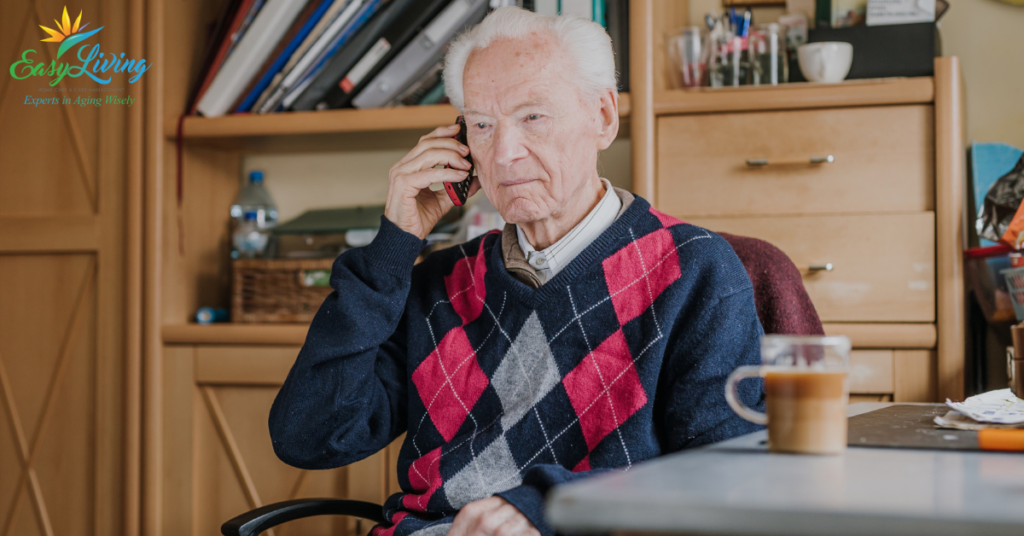When it comes to elder health, even the healthiest people tend to experience more issues as they age. Check out any senior’s medicine cabinet and you’ll usually find multiple medications. The median number of prescription medications used among adults 65+ hovers around four, a continual increase over the past few decades. The proportion taking five or more medicines is around 40%.
Similarly, many elders manage multiple conditions and see several doctors. We often find when we first start working with clients that their schedules consist of many medical visits. Sometimes there is very little coordination. And, often, no one is discussing things like treatment expectations, reasons for testing, and social determinants that may be impacting health.
When it comes to elder health why are some aging parents secretive?
First of all, if your family typically doesn’t discuss these types of things, it may feel awkward to suddenly start. Just having these discussions, and especially the way they’re framed, may cause the elder to feel “old” and “helpless”. This can be particularly true because you are the son or daughter. We know how challenging it can be to have healthy discussions with family.
Second, many elders worry that admitting to health issues will be a sign of weakness. Some have fears of being “put into a nursing home”. Or, they may have some vague worries about losing their independence or being forced to make changes. If they feel themselves having more difficulty, they may be especially reluctant to admit it. Elder health issues such as memory problems or depression create even more fear in most seniors. It is not unusual for them to try to cover up these problems.
Elder Health Experts’ Tips: From Secretive to Helpful
Quality Conversations and Questions
Most importantly, our elder health experts recommend opening up conversations early, if possible. Normalize discussing health. Bring up your own health checkups and concerns. Talk about medical management, share ideas, and offer help where they may actually want it. For example, you could offer to review Medicare plan options on Medicare.gov for Dad. Perhaps he’d appreciate rides to appointments or help finding cheaper medications. You can set up an iPad for him to do telehealth visits.
It’s also important how you frame the conversation and the types of questions you ask. Our elder health experts have shared before about the TEMPO method and other important considerations in having discussions. Additionally, think about what questions you ask. Open-ended questions can be useful for getting more detail versus one-word responses. But, also, do not ask vague/general questions. For example, “How are you doing?” will often get “I’m fine.” Instead, ask specific questions. This is also a way to better assess what is going on without putting the person on the defensive. Chat about meals, activities, and daily life. Ask about their interests and their routine. Their answers can be quite telling. Look for patterns of withdrawal, limiting activities, or changing routines.
We have a checklist of wellness questions we created for families to assess their loved ones’ safety at home during the pandemic, but these can be useful anytime.
Get a free copy of the checklist.
If you generally have a strained relationship or don’t feel like you’re as close to your parent as you once were, we have some conversation starter ideas too. Even when you are close, these can be useful to keep open lines of communication. And, they help make sure you don’t just focus on elder health issues and problems.
Visits/Observation
You can also gather a lot of information from observing while visiting. If you don’t live nearby, make regular calls (or, better yet, video calls). Also, consider how household helpers can serve as your “eyes and ears” along with generally ensuring your loved one’s well being.
Try to attend medical appointments with your parent. You might ease into this by offering to drive them first. Right now, it may be more difficult to attend due to pandemic restrictions. However, this has also opened up the possibility of telehealth which can be easier for long-distance caregivers.
Health Organization and the Elder Health File
Offer help with getting things organized for your parent. We recommend creating an elder health file. This should include health history, diagnoses, surgeries, and current and discontinued medications or treatments. Moving forward you can ask for (or download if they store information on a portal) copies of visit summaries and tests from providers. You can also keep a profile on MyMedicare.gov, which is offered free to all Medicare recipients.
This can spark conversation and give you a window into your parent’s current medical situation and history. Also, if there’s an emergency or you have to start helping, you’ll need this information.
Getting Help with Elder Health Management
If you’ve tried some of the above tips from our elder health experts and they haven’t worked, why not get help directly? Our Care Coaches often have ideas about how to approach your situation. Additionally, they sometimes have greater success partly because they are not family. Your loved one may be more open to having professional help, especially when pitched to them in the right way. They can work as a liaison for the conversations as well as serve as a patient advocate and coordinator. This may be to deal with some specific crisis or problem, or as an on-demand coach to be by your side.
Their education and years of experience give them insights into different ways to tackle specific challenges. Our care managers have had success with even highly reluctant clients.







